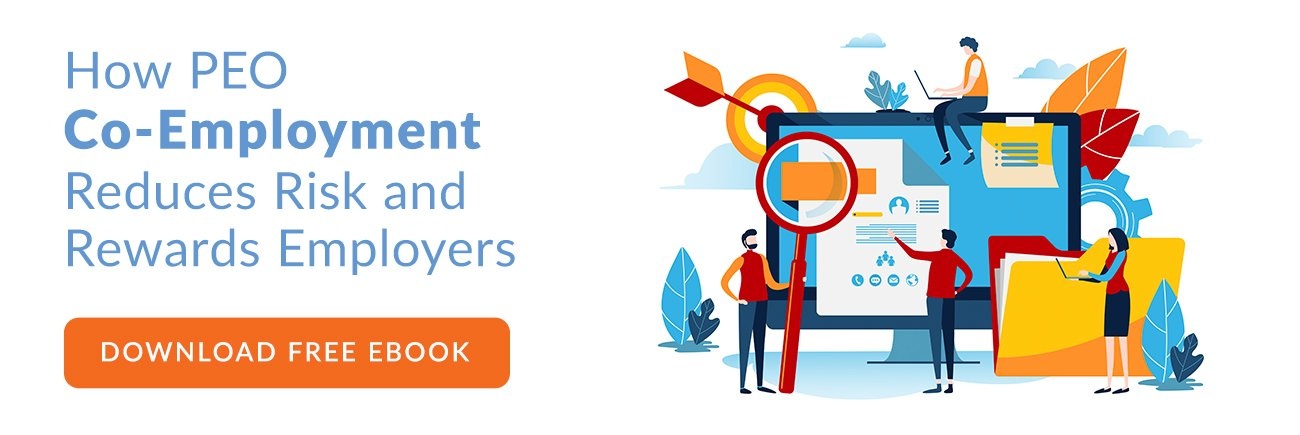Partnering with a third-party HR service provider can carry significant risks. Choosing the correct form of co-employment can help you avoid serious consequences, maximize benefits, and cut costs.
Co-employment is a collaboration between an employer and an outsourcing HR partner that involves delegating HR tasks and sharing liability.
The two most popular forms of co-employment arrangements are partnerships with a professional employer organization (PEO) or partnerships with a temporary staffing agency. While the former can help you gain a competitive advantage, the latter puts your business at risk of joint employer liability.
Let's take a closer look at how a PEO can prevent co-employment risks for your business.
What is joint employer liability?
A joint employer partnership is a collaboration of two employers who share control over the workforce. While it can be a convenient option, this arrangement also means that the client employer shares liability for the partner's poor employment practices.
Both employers can be liable for:
- Employment law violations
- Legal claims by employees
- Failure to comply with wage-related regulations
For example, the wrong approach to employee classification when working with a temporary staffing agency resulted in a sizable lawsuit against Microsoft. Even though the tech giant hired freelancers to work on its projects, it turned out that they were entitled to some of the benefits provided to the regular workforce.
According to the latest proposal regarding joint employment liability, it's integral for employers to review their contracts with staffing agencies since they can lead to a loss of control over the workforce.
While productive, joint employment comes with several nuances, including liability for another employer's actions.
How does PEO co-employment differ from staffing agency co-employment?
When you enter a co-employment relationship with a staffing agency, you face joint employer liability. Essentially, the client employer and the agency share supervision and control over employees.
Both employers in the joint employment agreement are liable for ensuring compliance with employment regulations. If the staffing agency makes an error (e.g., fails to pay wages on time), the client employer also becomes liable. This can become a significant reputational and financial issue.

Staffing agencies may have full or partial control over:
- Wages and benefits
- Hours of work and scheduling
- Hiring and discharge
- Employee supervision
Alternatively, when you enter a co-employment partnership with a PEO, you don't face joint employer liability. This is because the PEO has no control over your staff or any other decisions related to your human resource activities.
While a PEO can help with recruitment, onboarding, training, and retention, all significant decisions remain in your hands.
A professional employer organization becomes a co-employer for administrative purposes only. Since they don't participate in decision-making, you have full control over your workforce.
Can PEO co-employment ever lead to joint employer liability?
Since PEO has no control over your employees, the co-employment agreement can't lead to joint employer liability.
The only way it could happen is if the professional employer organization takes over employment responsibilities beyond the scope of HR outsourcing. It's up to the employer to choose the direction of the PEO collaboration. However, in most cases, the purview of trustworthy PEO work doesn't include joint employer schemes.
How can you reduce the risks of co-employment?
If you plan to work with a staffing agency, you must be careful about the possible risks. To reduce the potential for reputational and financial issues for your company, you can:
- Design a transparent client services agreement with an extensive description of how employment responsibilities are shared.
- Make sure your company retains primary control over HR responsibilities.
- Monitor compliance with all relevant local, state, and federal laws.
- Ensure clear communication with the co-employment partner.
If you want to keep the risks of co-employment to a minimum, you must choose a reliable HR outsourcing partner with experience with clients in your industry.
Stop Worrying about Co-Employment with a PEO
While temporary staffing agencies could cause you to face joint employment risks, co-employment agreements with PEOs are safe. The only way you may need to deal with joint liability is by agreeing to services that go beyond the scope of regular PEO solutions.
If a PEO offers you temporary staffing services, it should raise a red flag. Most likely, it means that they aren't a professional employer organization. Working with such a service provider requires a careful approach to risk mitigation.



